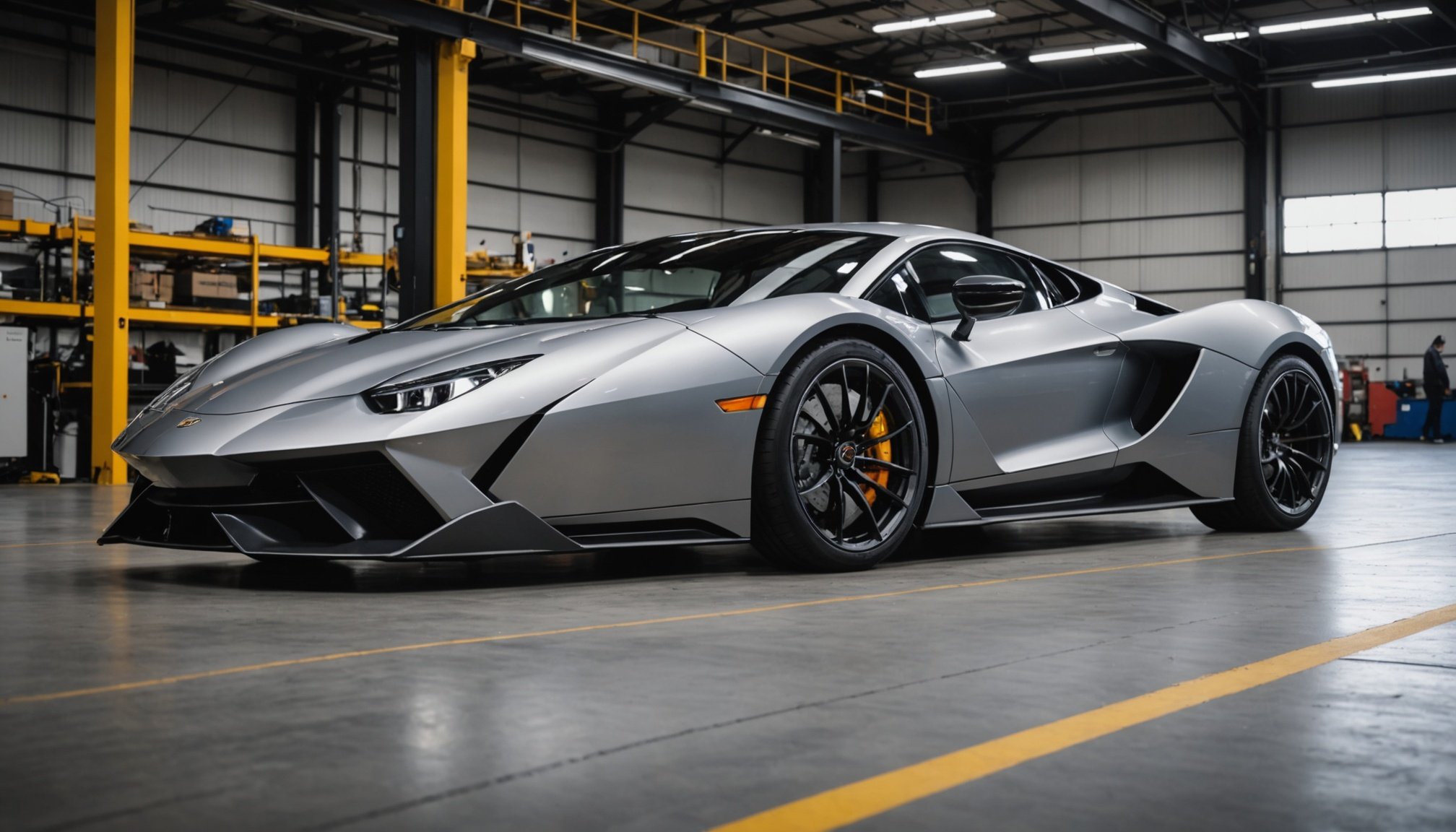Overview of Recent Innovations in Car Manufacturing
In recent years, car manufacturing innovations have accelerated rapidly, reshaping the automotive technology landscape. Historically, the industry has evolved from manual assembly to automation, establishing the foundation for today’s cutting-edge advancements. Keeping pace with technological progress is crucial as it influences global competitiveness and environmental sustainability.
Several key sectors are impacted by recent innovations in the car manufacturing realm. Electric vehicles (EVs) have been at the forefront, catalysing changes in sustainable manufacturing practices. Improvements in energy-efficient battery technologies and modular production techniques are just a few examples of this evolution. Additionally, automation and manufacturing robotics have transformed production lines by integrating AI and machine learning, which enhance precision and operational efficiency.
Topic to read : Unlocking Peak Turbo Efficiency: Discover How an Intercooler Upgrade Transforms the VW Golf GTI Mk6
Another area experiencing significant growth is the use of advanced materials and design techniques, such as composite materials and 3D printing. These innovations result in vehicles that are not only more fuel-efficient but also exhibit improved performance metrics. Moreover, the role of data analytics cannot be understated, offering predictive maintenance and enhancing production strategies in the modern manufacturing process. These innovations collectively set the stage for a transformative future in car manufacturing.
Advancements in Electric Vehicle (EV) Production
Recent innovations in Electric Vehicles (EVs) represent a transformative shift toward sustainable manufacturing. Significant strides have been made in battery technologies, especially relating to autonomy and charging speed. These advancements not only extend the driving range but also reduce charging time, making EVs more convenient for everyday use.
Also read : Unveiling Auto Safety Advancements: A Journey for Car Aficionados
Battery Technologies
Developments in battery composition and structure are at the forefront. The focus is on creating lightweight, high-energy-density materials that can store more power and withstand extensive use. Enhanced battery life cycles provide a longer-lasting power source, crucial for the widespread adoption of EVs.
Modular Production Techniques
Adoption of modular production techniques allows manufacturers to assemble diverse vehicle models on a single platform. This flexibility reduces production time and costs, fostering a more adaptable manufacturing environment tailored to shifting consumer demands.
Recycling and Sustainability Initiatives
Manufacturers are prioritising recycling and sustainability initiatives to mitigate the environmental impact. Innovations in material recycling ensure that components, like batteries, are reclaimed and reused, promoting eco-friendly practices. These efforts showcase a commitment to minimizing waste and enhancing sustainability in the car manufacturing industry.
Automation and Robotics in Manufacturing
In the realm of car manufacturing, the integration of automation technology and manufacturing robotics is a game-changer. Utilizing AI and machine learning increases the effectiveness of production lines, ensuring that operations run smoothly and with enhanced precision. But how exactly does this transformation take place? It all begins with robotics that are capable of performing complex tasks with unparalleled accuracy and speed, surpassing human capabilities.
Safety, another crucial aspect, sees significant improvements through the implementation of intelligent automation systems that minimize human error and reduce workplace injuries. This adds a layer of protection for workers, subsequently leading to a more secure manufacturing environment.
Some key benefits of these advancements include:
- Optimised production processes, ensuring waste reduction.
- Reduced operational costs, thanks to increased efficiency.
- Increased production capacity, meeting the growing global demand for vehicles.
Moreover, these innovations directly boost productivity, equipping manufacturers with a competitive edge in a rapidly evolving market. Embracing this technology not only meets current industrial demands but also sets the foundation for future developments in the automotive sector. As a result, manufacturers remain at the forefront of technological and safety advancements in the industry.
Advanced Materials and Design Techniques
Modern car manufacturing innovations extensively rely on advanced materials and pioneering design techniques. Utilising lightweight materials such as aluminium and carbon fibre composites is pivotal for improving vehicle fuel efficiency. These materials reduce the overall weight of the vehicle, leading to enhanced performance and reduced energy consumption, aligning with global sustainability goals.
3D Printing in Automotive Design
The introduction of 3D printing has revolutionised automotive technology, enabling rapid prototyping and custom production. This innovation allows manufacturers to swiftly adapt designs, producing complex parts that would be costly and time-consuming using traditional methods. The flexibility of 3D printing supports experimentation with new materials and structures, leading to more sophisticated and efficient vehicle designs.
Impact on Vehicle Performance
Advanced materials and techniques directly influence vehicle performance. They contribute to better aerodynamics, reduced emissions, and increased durability. The integration of these elements results in cars that offer superior driving dynamics and safety. As automotive technology continues to advance, the adoption of these advanced manufacturing techniques will become increasingly critical in meeting the demands of both manufacturers and consumers, setting new standards for the future of the automotive industry.
The Role of Data Analytics in Manufacturing
In the realm of car manufacturing, data analytics plays an instrumental role in refining production processes. It reshapes production strategies by harnessing the power of big data, leading to profound insights for manufacturers. By analyzing vast datasets, companies can fine-tune their systems, ensuring an optimal use of resources and enhancing overall efficiency.
Predictive maintenance stands out as a pivotal application of data analytics. By predicting equipment failures before they occur, manufacturers can minimize downtime, saving both time and financial resources. This proactive approach not only ensures seamless production lines but also extends the lifespan of machinery, in turn, contributing to sustainable manufacturing practices.
Moreover, data analytics strengthens customer feedback loops. By systematically collecting and processing customer data, manufacturers attain a deeper understanding of consumer needs and preferences. This insight facilitates the tailoring of products, ensuring they align closely with market demands. As car manufacturing continues to evolve, leveraging data analytics remains at the heart of maintaining competitiveness and driving innovation. The integration of precise data analysis assists in efficiently navigating challenges, ensuring the industry remains at the forefront of technological advancement.
Case Studies of Leading Manufacturers
In the dynamic automotive industry, analysing the strategies of industry leaders offers valuable insights into successful practices. Companies like Tesla, BMW, and Ford stand out due to their innovative approaches to car manufacturing innovations.
Tesla’s Approach to Manufacturing
Tesla is at the forefront with its groundbreaking use of automation technology. The company integrates AI extensively in their production lines to boost efficiency and precision. Tesla’s commitment to innovation is evident in their continuous improvement of electric vehicles (EVs), showcasing cutting-edge automotive technology.
BMW’s Sustainability Initiatives
BMW leads in sustainable manufacturing by prioritizing recycling and eco-friendly production methods. Their use of composite materials reduces carbon footprints and aligns with global environmental goals. BMW’s emphasis on sustainability acts as a benchmark for the industry.
Ford’s Adaptive Manufacturing Plant
Ford’s shift to flexible manufacturing systems exemplifies adaptability in the face of changing consumer demands. By implementing advanced manufacturing techniques, Ford has increased production agility without sacrificing quality. The integration of modular production techniques at Ford supports diverse vehicle models on shared platforms, illustrating versatility and responsiveness to market trends.
Future Trends in Car Manufacturing
Exploring the future of automotive manufacturing, several groundbreaking trends are emerging. One pivotal aspect involves emerging technologies such as autonomous vehicles and advanced AI systems. These innovations promise to revolutionise car manufacturing by introducing unprecedented levels of automation and personalisation.
Emerging Technologies to Watch
Within the future of automotive trends, automated technologies capture considerable attention. Fully autonomous vehicles are at the forefront, poised to redefine mobility by reducing human error and enhancing travel safety. Furthermore, advancements in connectivity technologies seek to improve inter-vehicle communication, optimising traffic flow and reducing congestion. These developments signal a shift towards a more integrated and efficient transportation system.
Implications of Global Trade on Manufacturing
Global trade impacts manufacturing trends significantly. Current shifts in trade policies can influence supply chains, affecting material availability and production costs. Manufacturers are compelled to adapt by localising supply chains and leveraging regional trade agreements for sustained growth.
Consumer Expectations and Innovation
Today’s consumers demand technologically advanced vehicles that align with their environmental and lifestyle preferences. The automotive industry faces pressure to innovate continuously, pushing for eco-friendly solutions and customisable vehicle options to cater to these evolving expectations.
Interviews with Industry Experts
Listening to automotive experts provides valuable industry insights, particularly regarding the rapidly evolving landscape of the automotive sector. Top engineers reveal that innovation remains a cornerstone for companies aiming to stay competitive. They highlight that progressive shifts in automotive technology are becoming increasingly important. In particular, experts note advancements in AI integration and automation technology as pivotal factors driving this evolution.
When industry analysts are asked about future predictions, they consistently cite the ongoing development of electric vehicles and autonomous driving technology. These trends showcase a shift towards more efficient and sustainable manufacturing practices. Experts also underscore the significance of manufacturing robotics in optimizing production, making assembly lines faster and more precise.
As the automotive landscape diversifies, the emphasis on innovation becomes more pressing. Experts unanimously agree that those manufacturers who master new technologies and adapt quickly will likely lead the industry. Staying attuned to consumer demands and environmental considerations is an imperative focus area. These insights cement the idea that future success hinges on foresight and the agile adoption of new technologies in car manufacturing.










